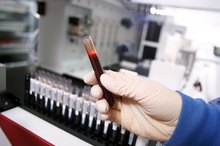What May Cause Too Much Protein in Blood?
There are several potential causes of elevated levels of protein in the blood 2. The type of protein circulating in the blood is often an antibody. The plasma cell that produces antibodies is part of the immune system, and thus, elevated protein levels in the blood may indicate an immune system disorder. Importantly, a high-protein diet does not cause elevated protein levels in the blood 2.
Tests and Normal Protein Levels
Your doctor may suggest a total protein test, either as part of a routine check-up or to investigate the cause of certain signs and symptoms 1. Typically, a nurse or technician takes a blood sample, usually from a vein in the arm, and then sends it to a lab for testing. The tube of blood is place in a centrifuge, which spins the blood at a very high speed in order to separate the blood cells from the serum. The serum is then removed and the amount of protein is tested in this fluid. Protein levels between 6.0 and 8.3 g/dL are considered normal.
- Your doctor may suggest a total protein test, either as part of a routine check-up or to investigate the cause of certain signs and symptoms 1.
- Typically, a nurse or technician takes a blood sample, usually from a vein in the arm, and then sends it to a lab for testing.
Inflammation or Infection
What Does High Protein in Your Blood Mean?
Learn More
One underlying cause of elevated levels of protein in the blood is a long-lasting infection or chronic inflammation. The chronic stimulation of the immune system caused by the inflammation or an infection causes the consistent production of antibody proteins. Infections that can cause elevated protein levels include hepatitis B and C, as well as HIV infection.
MGUS
The acronym “MGUS” stands for “monoclonal gammopathy of undetermined significance”, which means that elevated antibodies have been found in the blood, but there is no known cause 4. The circulating antibody in this disease is called M protein, in which the "M" stands for "monoclonal." Monoclonal antibodies are a collection of antibodies that are exactly the same. Therefore, the M proteins of MGUS are exact clones of each other. The cell producing this protein, called a plasma cell, produces massive quantities of M protein, ultimately leading to elevated levels of total protein in the blood 1.
Multiple Myeloma
What Causes a High Level of Protein in the Blood?
Learn More
Another cause of elevated blood protein levels is a type of cancer called multiple myeloma 3. Similar to MGUS, plasma cells produce massive quantities of antibodies that increase the total protein level in the blood 1. In contrast to MGUS, however, the plasma cells have become cancerous and divided uncontrollably. The numerous plasma cells often stick together and form tumors that invade various bones, which can cause bone weakness, pain, and easy breaks.
Related Articles
References
- MedlinePlus: Total Protein
- Mayo Clinic: High Blood Protein -- Causes
- Mayo Clinic: Monoclonal gammopathy of undetermined significance
- Leukemia and Lymphoma Society. Diagnosis.
- International Myeloma Foundation. Tests to assess monoclonal protein. Updated August 1, 2019.
- Papanikolaou X, Rosenthal A, Dhodapkar M, et al. Flow cytometry defined cytoplasmic immunoglobulin index is a major prognostic factor for progression of asymptomatic monoclonal gammopathies to multiple myeloma (subset analysis of SWOG S0120). Blood Cancer J. 2016;6(3):e410. Published 2016 Mar 25. doi:10.1038/bcj.2016.19
Writer Bio
Leah DiPlacido, a medical writer with more than nine years of biomedical writing experience, received her doctorate in immunology from Yale University. Her work is published in "Journal of Immunology," "Arthritis and Rheumatism" and "Journal of Experimental Medicine." She writes about disease for doctors, scientists and the general public.









